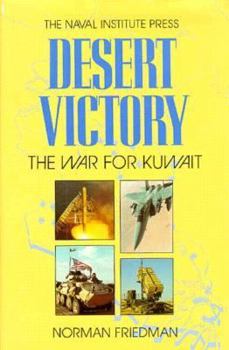Desert Victory: The War for Kuwait
Select Format
Select Condition 
Book Overview
Analyzes the Persian Gulf War, describes the strengths and weaknesses of the Coalition forces, and evaluates the strategies and weapons used in the war. This description may be from another edition of this product.
Format:Hardcover
Language:English
ISBN:1557502544
ISBN13:9781557502544
Release Date:January 1991
Publisher:US Naval Institute Press
Length:435 Pages
Weight:0.05 lbs.
Dimensions:1.6" x 5.7" x 8.7"
Customer Reviews
3 ratings
Unlearned lessons
Published by Thriftbooks.com User , 17 years ago
The outcome of a war between the world's biggest, most advanced power and a nation -- if that's what Iraq is -- of mostly illiterate barley farmers should not have been in doubt. For many it was. Will Americans, as a group, do any better at what Norman Friedman calls 'lessons learned and mislearned' after the fact? Maybe a little. Friedman's 'Desert Victory' is more sensible than 99% of the prewar commentary. However, it is less a quick history of the war than a summary of 1980s military philosophy, a subject Friedman has been covering all along. Thus, for every paragraph about events in the gulf, we get a couple of pages of instruction in elementary strategy and tactics. This is not a criticism: If we learned anything for sure from this little war, it is that the American public understands next to nothing about the practical problems of using force and violence in international affairs. 'Perhaps the most interesting lesson of the war,' writes Friedman, 'is that the sort of conventional analysis used to project Iraqi performance failed to take into account the structural problems inherent in Saddam's Iraq.' He is not writing about hysterical journalists or frightened civilians but about the experts in the Defense and State departments and the National Security Council. They failed to correctly estimate the likelihood that Iraq would be an aggressor or the ability of Iraq to mismanage what Friedman likes to call 'national assets.' While noting the failure, Friedman fails to offer a cure; yet it was obvious to anyone who has studied the history of the 20th century that a state structured like Saddam's was likely to be adventuristic and that a society like Iraq's -- that is, a medieval society -- could not seriously engage modern states on any grounds except ideological and propagandistic. Didn't we learn anything in Vietnam? Evidently not. Well, maybe George W. Bush learned a negative lesson from Lyndon Johnson. After making the decision to use force, he let the professionals decide how. Friedman says many in Washington were 'irked' by that. No doubt. The best part of 'Desert Victory' is Friedman's complex analysis of the factors arguing for and against use of force. The apparent international unanimity need not be taken too seriously, but Bush was a clear winner in the propaganda battle. Concerning the actual fighting, Friedman's touch is much less certain. In large part this is because he is wedded to a Reagan-era Navy policy of using aircraft carriers to defeat the world's largest land power -- surely a more dubious concept than Friedman thinks, although probably we'll never have to put it to the test. Anyway, he attempts to use the gulf results to prove the idea has merit, but the circumstances were hardly relevant. America's big flattops probably saved Saudi Arabia; and even if they didn't, we didn't have anything else that could have. Score one for Friedman and the Navy. But if you read his accounts carefully, a lesson of the gulf becomes ap
Good analysis of Gulf War I, but a bit dry....
Published by Thriftbooks.com User , 20 years ago
Military history comes in various flavors, just like ice cream. On one side of the spectrum, you can find books that analyze the wider strategic and tactical aspects of a conflict, with emphasis on politics and the commanders on both sides. On the other, you find books that not only deal with the "big picture" but also strive to show the conflict from the combatants' vantage point.Desert Victory is one of those "big picture" books that focuses more on the strategies and tactics used by both Iraqi dictator Saddam Hussein and President George H.W. Bush and their respective military commanders. Written shortly after the war (it was published in the fall of 1991) by noted historian and military analyst Norman Friedman, Desert Victory traces the roots of the first Persian Gulf War to Saddam's rise to power in the late 1970s, his disastrous foray into Iran in 1980, the misguided policies of moderate Arab countries and two U.S. administrations to support Iraq (a mostly Shi'a Muslim country ruled by a Sunni Arab minority) against the perceived threat from Shiite Iran and the genesis of Saddam's invasion of the tiny but oil-rich emirate on his southern border. Friedman explains the events of the Persian Gulf War ably and intelligently, analyzing the tactics, strategies and forces employed by both sides. It is a well-researched account of both Operations Desert Shield (the buildup) and Desert Storm, with particular attention being paid to the diplomatic and military forging of the coalition that would liberate Kuwait in February of 1991.However, readers who prefer the "Cornelius Ryan/Stephen Ambrose" approach are going to be disappointed. There are few eyewitness anecdotes in the text, and the prose does tend to be rather dry.
Friedman scores again!
Published by Thriftbooks.com User , 21 years ago
Friedman is one of America's best military autohrs and historians. His FIFTY YEAR WAR is the best account of the strategies and politics of the cold war. This DESERT VICTORY is an excellent, though somewhat short, review of the Kuwait war.I'm rather hoping Friedman writes an account of last month's Iraq war ASAP, it is sure to be the best of the dozens of books sure to come out of the war.





